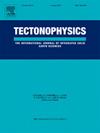Structural evolution of the Horoman peridotite complex in conjunction with the formation of the Hidaka Metamorphic Belt, Hokkaido
IF 2.7
3区 地球科学
Q2 GEOCHEMISTRY & GEOPHYSICS
引用次数: 0
Abstract
We conducted crystal-fabric analyses of peridotites within the Horoman peridotite complex in the Hidaka metamorphic belt, Hokkaido, Japan. Over fifty oriented peridotite samples were collected and analyzed for olivine fabric strength (J-index) and crystallographic preferred orientations (CPOs). The peridotites contained four olivine CPOs: A, E, D, and AG types. We confirmed that olivine CPOs presented a transitional distribution from E to A to AG type from south to north. Previous experimental studies have demonstrated that E type CPO can merge under hydrous conditions. In addition, magnetotelluric observations suggested that the subducting oceanic plate supplies pore fluid to the basal thrust in the region (the Hidaka Main Thrust). Therefore, we infer that the E type CPO was originated from a local water infiltration event. AG type CPO, on the other hand, was considered as a secondary product enhanced by the synkinematic melts in the northern (geological upper) part, combined with the pressure-temperature path inferred by previous petrological studies. Furthermore, we reconstructed the senses of shear strain using the microstructure and olivine crystal-fabrics. Then we built the tectonic history of the Horoman peridotite complex integrating the structural development of the Hidaka metamorphic belt.
与北海道日高变质带的形成有关的幌满橄榄岩复合体的构造演化
我们对日本北海道日高变质带霍罗曼橄榄岩群中的橄榄岩进行了晶体构造分析。我们收集了五十多个取向橄榄岩样本,并对其橄榄石结构强度(J-指数)和晶体学优选取向(CPO)进行了分析。橄榄岩包含四种橄榄石 CPO:A、E、D 和 AG 型。我们证实橄榄石 CPOs 从南到北呈现出从 E 型到 A 型再到 AG 型的过渡分布。之前的实验研究表明,E 型 CPO 在水合条件下可以合并。此外,磁强计观测表明,俯冲的大洋板块为该地区的基底推力(日高主推力)提供了孔隙流体。因此,我们推断 E 型 CPO 起源于当地的水渗透事件。另一方面,AG 型 CPO 被认为是北部(地质上部)同步熔融强化的次生产物,与之前岩石学研究推断的压力-温度路径相结合。此外,我们还利用微观结构和橄榄石晶格重建了剪切应变的感应。然后,我们结合日高变质带的构造发展,构建了霍罗曼橄榄岩群的构造史。
本文章由计算机程序翻译,如有差异,请以英文原文为准。
求助全文
约1分钟内获得全文
求助全文
来源期刊

Tectonophysics
地学-地球化学与地球物理
CiteScore
4.90
自引率
6.90%
发文量
300
审稿时长
6 months
期刊介绍:
The prime focus of Tectonophysics will be high-impact original research and reviews in the fields of kinematics, structure, composition, and dynamics of the solid arth at all scales. Tectonophysics particularly encourages submission of papers based on the integration of a multitude of geophysical, geological, geochemical, geodynamic, and geotectonic methods
 求助内容:
求助内容: 应助结果提醒方式:
应助结果提醒方式:


